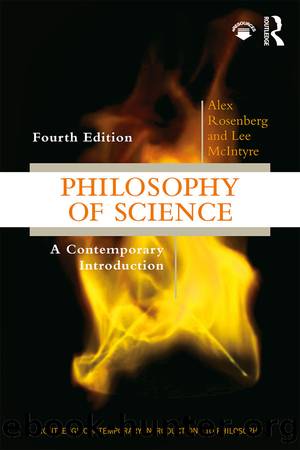Philosophy of Science by Alex Rosenberg;Lee McIntyre;

Author:Alex Rosenberg;Lee McIntyre;
Language: eng
Format: epub
Publisher: Taylor & Francis Ltd
Published: 2019-06-15T00:00:00+00:00
Summary
The axiomatic account of scientific theories explains how the laws of a theory work together to provide an explanation of a large number of empirical or observable regularities by treating theories as deductively organized systems, in which the assumptions are hypotheses confirmed by observations about the generalizations that are derived from them. This conception of laws as hypotheses tested by the consequences deduced from them is known as âhypothetico-deductivism,â a well-established account of how theories and experience are brought together.
Theories often explain by identifying the underlying unobserved processes or mechanisms that bring about the observable phenomena that test the theories. Reductionism labels a longstanding view about the relationship of scientific theories to one another. According to reductionism, as a science deepens its understanding of the world, narrower, less accurate, and more special theories are revealed to be special cases of or explainable by derivation from broader, more complete, and more accurate theories. Derivation requires the logical deduction of the axioms of the narrower theory from the broader one, and often the correction of the narrower theory before the deduction is effected. Reductionists seek to explain the progress of science over the period since the Newtonian revolution by appeal to these intertheoretical relations. The reduction of scientific theories over centuries, which seems to preserve their successes while explaining their failures (through correction), is easy to understand from an axiomatic perspective on scientific theories.
The hypothetico-deductivism of the axiomatic account of theories (and indeed the general epistemological perspective of science as based on observation and experiment), however, faces grave difficulty when it attempts to explain the indispensability of terms in theories that identify theoretical, unobservable entities, like cellular nuclei, genes, molecules, atoms, and quarks. For, on the one hand, there is no direct evidence for the existence of the theoretical entities these terms name, and, on the other hand, theory cannot discharge its explanatory function without them. Some theoretical entities, such as gravitation, are truly troublesome, yet at the same time we need to exclude from science all mysterious and occult forces for which no empirical evidence can be provided. The notion that meaningful words must eventually have their meaning given to them by experience is an attractive one. Yet finding a way for theoretical language to pass this test, while excluding the terms of uncontrolled speculation as meaningless, is a challenge that any account of scientific theories must face.
The puzzle that hypothesizing theoretical entities is indispensable to explanation and unregulated by experience is sometimes solved by denying that scientific theories seek to describe the underlying realities that systematize and explain observational generalizations. This view, known as instrumentalism, treats theory as a heuristic device, a calculating instrument for predictions alone. By contrast, realism, the view that we should treat scientific theory as a set of literally true or false descriptions of unobservable phenomena, insists that only the conclusion that a theory is approximately true can explain its long-term predictive success. Instrumentalists controvert this explanation.
Study Questions
1.Defend or criticize: âWhere theories cannot be expressed mathematically reduction is not possible.
Download
This site does not store any files on its server. We only index and link to content provided by other sites. Please contact the content providers to delete copyright contents if any and email us, we'll remove relevant links or contents immediately.
The European History Highway: A Guide to Internet Resources by Dennis A. Trinkle Scott A. Merriman(498)
The Seven Wonders of the Ancient World by Michael Denis Higgins(480)
European Security in a Global Context by Thierry Tardy(472)
European Security without the Soviet Union by Stuart Croft Phil Williams(472)
The Routledge companion to Christian ethics by D. Stephen Long Rebekah L. Miles(461)
Hudud Al-'Alam 'The Regions of the World' - a Persian Geography 372 A.H. (982 AD) by V. V. Minorsky & C. E. Bosworth(402)
Get Real with Storytime by Julie Dietzel-Glair & Marianne Crandall Follis(393)
Gorbachev And His Generals by William C. Green(393)
Tibetan Studies in Comparative Perspective by Chih-yu Shih Yu-Wen Chen(387)
Governance, Growth and Global Leadership by Espen Moe(385)
Hyperculture by Byung-Chul Han(382)
CliffsNotes on Fitzgerald's The Great Gatsby by Kate Maurer(363)
The Oxford History of the World by Fernández-Armesto Felipe;(357)
How Languages Are Learned 5th Edition by Patsy M Lightbown;Nina Spada; & Nina Spada(356)
The Egyptian Economy, 1952-2000 by Khalid Ikram(355)
Oral Poetry and Narratives from Central Arabia: The Poetry of Ad-Dindan : A Bedouin Bard in Southern Najd (Studies in Arabic Literature, Vol 17) (English and Arabic Edition) by P. M. Kupershoek P. Marcel Kurpershoek(345)
The Oxford Handbook of the Incas by Sonia Alconini(336)
Europe Contested by Harold James(323)
The Hutchinson Dictionary of Ancient and Medieval Warfare by Peter Connolly John Gillingham John Lazenby(308)
